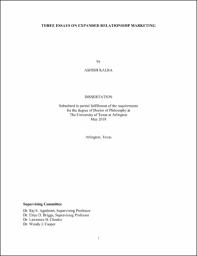
ATTENTION: The works hosted here are being migrated to a new repository that will consolidate resources, improve discoverability, and better show UTA's research impact on the global community. We will update authors as the migration progresses. Please see MavMatrix for more information.
Show simple item record
| dc.contributor.advisor | Agnihotri, Raj S. | |
| dc.contributor.advisor | Briggs, Elten D. | |
| dc.creator | Kalra, Ashish | |
| dc.date.accessioned | 2020-06-23T21:05:16Z | |
| dc.date.available | 2020-06-23T21:05:16Z | |
| dc.date.created | 2018-05 | |
| dc.date.issued | 2018-04-09 | |
| dc.date.submitted | May 2018 | |
| dc.identifier.uri | http://hdl.handle.net/10106/29161 | |
| dc.description.abstract | Customer engagement has become a recent buzzword in marketing and has emerged as a hot topic among practitioners and academics. However, there is no consensus on how to define customer engagement. This has made it difficult for researchers to advance the theory of customer engagement and researchers have been unable to offer any specific managerial insights on how to enhance such behaviors. This dissertation addresses these gaps by systematically reviewing the customer engagement literature, offering a unified framework to advance theory, and subsequently developing managerially driven insights.
In the first essay, we adopt relationship marketing theory and service-dominant logic to offer a conceptual framework to define customer engagement. Based on systematic literature review, customer engagement is defined along a relationship continuum. It is proposed that customer engagement can be defined both as a psychological state and a behavior depending on the sequential flow of relation with the customer after the purchase. In the second essay, salesperson’s social capital is linked to customer engagement behaviors. Survey research is utilized to test a conceptual framework. A dyadic 217 salesperson-customer matched data from a business-to-business study context provide support to the claims that social capital enhances competitive intelligence collection and use which further enhances customer engagement behaviors. The third essay extends the theory on customers’ perceptions of employee’s ethics and corporate social responsibility and how they impact customer co-creation behavior. Findings from survey research conducted using a sample of customers of major US banks provide partial support to our claims. Overall, the findings of this dissertation offer several research findings and directions for future exploration of the construct by marketing researchers and practitioners. | |
| dc.format.mimetype | application/pdf | |
| dc.language.iso | en_US | |
| dc.subject | Relationship marketing | |
| dc.subject | Service-Dominant logic | |
| dc.subject | Customer engagement | |
| dc.subject | Social capital | |
| dc.subject | Competitive intelligence | |
| dc.subject | Corporate social responsibility | |
| dc.subject | Employee's ethics | |
| dc.subject | Identification | |
| dc.subject | Co-creation behavior | |
| dc.title | Three Essays on Expanded Relationship Marketing | |
| dc.type | Thesis | |
| dc.degree.department | Marketing | |
| dc.degree.name | Doctor of Philosophy in Marketing | |
| dc.date.updated | 2020-06-23T21:05:16Z | |
| thesis.degree.department | Marketing | |
| thesis.degree.grantor | The University of Texas at Arlington | |
| thesis.degree.level | Doctoral | |
| thesis.degree.name | Doctor of Philosophy in Marketing | |
| dc.type.material | text | |
Files in this item
- Name:
- KALRA-DISSERTATION-2018.pdf
- Size:
- 1.754Mb
- Format:
- PDF
This item appears in the following Collection(s)
Show simple item record


